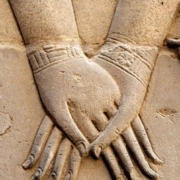Graceful Living / Graceful Masculinity: V’zos HaBracha
 Part of a periodic Torah series on graceful masculinity and Jewish values.
Part of a periodic Torah series on graceful masculinity and Jewish values.
וַיָּ֨מת שָׁ֜ם מֹשֶׁ֧ה עֶבֶד־יְקוָ֛ק בְּאֶ֥רֶץ מוֹאָ֖ב עַל־פִּ֥י יְקוָֽק׃
And Moses, servant of Hashem, died there, in the land of Moab, by the mouth of Hashem.
Deuteronomy 34:5
Humanity comes into being with a breath from the Divine. The Torah begins the story of our interaction with a moment of intimacy between G-d and Adam, and its final verses of Deuteronomy with Mose’s death through a Divine kiss. These two events are deeply connected and an aspect of the relationship is alluded to in the verse
וַיִּפַּח בְּאַפָּיו נִשְׁמַת חַיִּים וַיְהִי הָאָדָם לְנֶפֶשׁ חַיָּה
“and G-d breathed into his nostrils the soul of life; and Adam became a living soul”.
In the Hebrew, the last letter of each word forms the phrase: “and Mose died” – וימת משה, another way of connecting the beginning and the end of the Torah.
In Sefer Yetzirah, the letter “ת” governs “חן” – grace, and corresponds to the “פה בנפש” – the mouth in the soul. The mouth is so powerful that King Solomon writes “Death and Life are in the power of the tongue – מָ֣וֶת וְ֭חַיִּים בְּיַד־לָשׁ֑וֹן”. The letter “ת” has a numerical value of 400, as do the words “יד לשון” – the power of the tongue. When a person misuses this power and speaks badly of another, literally a bad tongue, they are punished with the affliction of being a metzora, often translated as leprosy. Metzora – מצרע also has a numerical value of 400 and such a person is considered dead, until they go through the atonement process.
The Talmud further elaborates on the binary potential of the final letter of the Hebrew alphabet, the “ת”: Rav said “ ״תָּיו״ – תִּחְיֶה, ״תָּיו״ – תָּמוּת Tuv – will live – will die. However, even life and death turn out to not be a binary. For example, wicked people are called “dead” while they are still alive, while the righteous are called alive even after their souls are returned to their source. There is even a position in the Talmud that Moses never died.
Moses is described as dying שם, there. The Talmud, using the exegetical principle of a gezerah shavah, connects the moment of Moses’ death to the moment when Moses received the Ten Commandments: “וֶהְיֵה־שָׁ֑ם וְאֶתְּנָ֨ה לְךָ֜ אֶת־לֻחֹ֣ת הָאֶ֗בֶן וְהַתּוֹרָה֙ וְהַמִּצְוָ֔ה אֲשֶׁ֥ר כָּתַ֖בְתִּי לְהוֹרֹתָֽם – wait there, and I will give you the stone tablets with the teachings and commandments which I have inscribed to instruct them”. The Talmud continues: “Just as there, he was standing and serving [before G-d]; so too, here” after his death.
Rav Meir Simcha of Dvinsk explains that it is angels who stand in a particular spiritual place, while people have the unique ability to grow and transcend their current location. It is this constant striving for greater perfection that gives us spiritual mobility. King David describes it as “My feet are on a straight path. In assemblies I will bless G-d”. The mystics understand this to be a reference to תיקון זה סוד התי”ו – the redeeming of the letter “tuv”, that without the “foot” at the bottom left, advancing the cause, it would be the letter “ח”.
This also speaks to the positive impact that we all want to have in this world. The world shouldn’t, and can’t, be the same without us. Our ability to make a difference isn’t limited just to the time we are alive. The Rabbis teach: גדולים צדיקים במיתתן יותר מבחייהן the righteous are even greater after their passing than while they are living.
Perhaps this is why the order of King’s Solomon’s teaching places life after death: “Death and life are in the power of speech”. This follows the Talmud’s assertion:
דאמר רבי יוחנן משום רבי שמעון בן יוחי כל ת”ח שאומרים דבר שמועה מפיו בעולם הזה שפתותיו דובבות בקבר
Rabbi Yochanan said in the name of Rabbi Shimon ben Yochai: Every scholar whose Torah is recited, their lips move in the grave.
It is possible that the Torah is emphasizing our ability to live on through our teachings and good deeds with the placement of this verse, as Moses dies, while eight verses of the Torah remain to be written.
Moshe was worthy of dying through a kiss from G-d because he sanctified his body as a vessel for Divine service. We are also able to live with a constant intimacy and closeness that offers us the opportunity to partner with the Creator in improving and enhancing this world, and the lives of those in it. As we look forward to reading Genesis next week, we recognize that beginnings and endings are fluid, and that a life lived with grace will always overflow the physical boundaries of time.

R. Mike Moskowitz is a founding builder at Bayit and scholar-in-residence at CBST.









